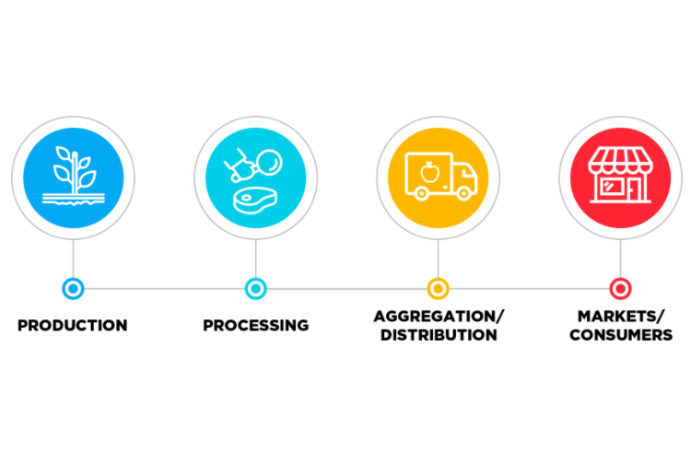Sustainable. Resilient. Inclusive. All words that are thrown around as often as a teething toddler throws tantrums but what do they mean in the context of food supply chains?

The Covid-19 pandemic unequivocally highlighted the vulnerabilities and inadequacies of global food systems, with estimates of between 720 and 811 million people facing food insecurity in 2020 (WFP & UNICEF, 2020). Unfortunately, due to uneven post-Covid economic recovery packages, rippling effects from the war in Ukraine, extreme weather events arising from climate change, with the Global South bearing the brunt of the arising food, energy and economic crises, enforcing sustainable food supply chains has never been so paramount but the challenges are monumental (WFP & UNICEF, 2022).
So, what are sustainable food supply chains? The concept of sustainable food supply chains originated in the 1980s to primarily address the negative impact of agricultural practices on the quality of food and human health. It has only been since the turn of the century that it has taken its current form and meaning – a more holistic, socially accepted, adaptive and resilient food system that is grounded within sustainable principles.
In theory, sustainable food supply chains from the food industry perspective involve the analysis of the companies along the varying parts of the chain that address their use of natural resources (environmental dimension) and how their actions also impact the wellbeing, health and safety of the workers, in addition to global economic development (social and economic dimension) (León-Bravo, Caniato & Caridi, 2019).
According to the Food and Agriculture Organisation (FAO), sustainable food supply chains are “the full range of farms and firms and their successive coordinated value-adding activities that produce particular raw agricultural materials and transform them into particular food products that are sold to final consumers and disposed of after use, in a manner that is profitable throughout, has broad-based benefits for society, and does not permanently deplete natural resources” (FAO, 2022).
Organisations operating within food supply chains have been coming under increasing regulatory and social pressure to improve and closely monitor the socio-ecological impact of their operations. An example of a global regulatory body is the implementation of the FAO’s Sustainable Development Goals (SDGs), particularly SDG 12 ‘Responsible Production and Consumption” which has a central focus on the challenges of sustainable agricultural and food supply chains (Kumar et al., 2022). Interestingly, target-12.3 specifically stresses the objective of halving food waste across different channels by 2030, seeing as the food supply chain produces approximately 1.3 billion tonnes of waste per year and accounts for 22% of the total global greenhouse gas emissions.

It is no secret that the agro-food sector is the human activity with the single most enormous impact on the environment due to the colossal use of resources, agro-chemicals, endless monocultures, residue burning, and food waste dumping among other factors. However, what adds to its ‘Bigfoot’ sized environmental footprint is the ever-increasing global population which is projected to reach 9.7 billion by 2050 – how are we going to feed everyone?
Just as different companies differ in their supply chain sustainability chain approaches due to inherent differences in chain lengths, farming contracts and general environmental awareness – many firms in the food industry have developed their own understanding and level of responsibility i.e., simply to have a competitive advantage, as a corporate responsibility strategy, as a response to consumer demands or to guarantee future supplies.
Along a similar vein, governmental bodies and officials have also taken significantly different approaches to how best to promote sustainable food supply chains. The reasoning behind this is quite simple; different countries have different needs and find themselves at different stages of development. For example, Zahaira et al., (2021) reported that within just the European context there are country-specific policy measures that reflect the concerns of their citizens – in Italy agri-food policies focused on product traceability, financial support for environmental initiatives, biodiversity protection, collaboration networks, and research and innovation. While in Norway policy documents suggest measures for achieving sustainable economic and environmental growth and further development in rural areas. In Romania, the transition towards sustainable food supply chains has only come to the fore recently therefore the policy measures are perhaps more basic, to reduce the use of pesticides and promote organic production methods, but nonetheless of significant importance.
Now you might be asking – is this a good or a bad thing? In short, good. It presents huge collaboration opportunities for countries to learn from each other to increase the transition from the current state of agribusiness monopolies plundering the Earth’s resources to sustainable supply chains that are fair to all those involved. The only major word of caution is the invaluable need for a more coherent message to be conveyed to stakeholders and consumers through one voice that will effectively communicate food supply chain sustainability issues.
References:
FAO (Food and Agriculture Organisation of the United Nations). Sustainable Food Systems. Concept and Framework. Available online: http://www.fao.org/3/ca2079en/CA2079EN.pdf (accessed on 20 July 2022).
Kumar, A., Mangla, S. K., & Kumar, P. (2022). An integrated literature review on sustainable food supply chains: Exploring research themes and future directions. Science of The Total Environment, 153411.
León-Bravo, V., Caniato, F., & Caridi, M. (2019). Sustainability in multiple stages of the food supply chain in Italy: practices, performance and reputation. Operations Management Research, 12(1), 40-61.
WFP & UNICEF. (2020).The state of food security and nutrition in the world 2020: Transforming food systems for affordable healthy diets.
WFP & UNICEF. (2022). The State of Food Security and Nutrition in the World 2022.
Zaharia, A., Diaconeasa, M. C., Maehle, N., Szolnoki, G., & Capitello, R. (2021). Developing Sustainable Food Systems in Europe: National Policies and Stakeholder Perspectives in a Four-Country Analysis. International Journal of Environmental Research and Public Health, 18(14), 7701.
